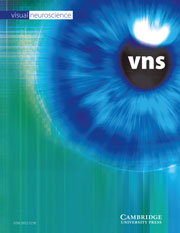Article contents
Sex-related differences in chromatic sensitivity
Published online by Cambridge University Press: 03 July 2008
Abstract
Generally women are believed to be more discriminating than men in the use of color names and this is often taken to imply superior color vision. However, if both X-chromosome linked color deficient males (∼8%) and females (<1%) as well as heterozygote female carriers (∼15%) are excluded from comparisons, then differences between men and women in red-green (RG) color discrimination have been reported as not being significant (e.g., Pickford, 1944; Hood et al., 2006). We re-examined this question by assessing the performance of 150 males and 150 females on the color assessment and diagnosis (CAD) test (Rodriguez-Carmona et al., 2005). This is a sensitive test that yields small color detection thresholds. The test employs direction-specific, moving, chromatic stimuli embedded in a background of random, dynamic, luminance contrast noise. A four-alternative, forced-choice procedure is employed to measure the subject's thresholds for detection of color signals in 16 directions in color space, while ensuring that the subject cannot make use of any residual luminance contrast signals. In addition, we measured the Rayleigh anomaloscope matches in a subgroup of 111 males and 114 females. All the age-matched males (30.8 ± 9.7) and females (26.7 ± 8.8) had normal color vision as diagnosed by a battery of conventional color vision tests. Females with known color deficient relatives were excluded from the study. Comparisons between the male and female groups revealed no significant differences in anomaloscope midpoints (p = 0.709), but a significant difference in matching ranges (p = 0.040); females on average tended to have a larger mean range (4.11) than males (3.75). Females also had significantly higher CAD thresholds than males along the RG (p = 0.0004), but not along the yellow-blue (YB) discrimination axis. The differences between males and females in RG discrimination may be related to the heterozygosity in X-linked cone photo pigment expression common among females.
Information
- Type
- Research Article
- Information
- Copyright
- Copyright © Cambridge University Press 2008
References
REFERENCES
- 50
- Cited by

